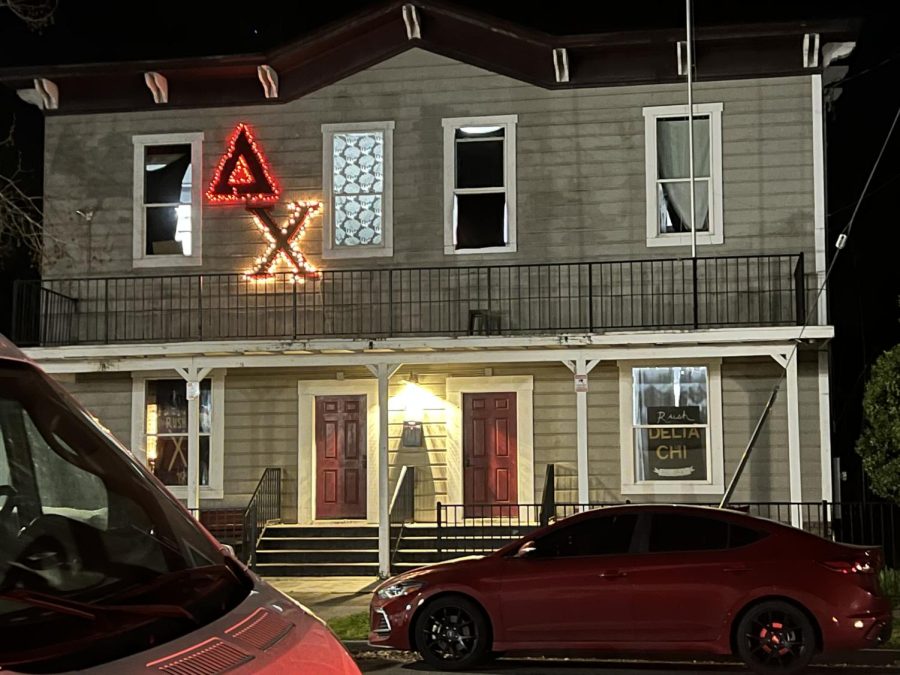Hazing is not new at Chico State. The latest offense comes from the fraternity Delta Chi. Chico State became aware of Delta Chi’s hazing rituals after an incident report form was submitted to the Student Conduct, Rights and Responsibilities office in March.
The Delta Chi Fraternity national office announced the revocation of the fraternity’s charter on April 10, following an investigation into the report’s description of pledges being forced to drink while exercising.
Andrew Staples, Chico State’s public relations officer said Karl Grindel, the executive director and CEO of the Delta Chi Fraternity national office released this statement:
“The Delta Chi Fraternity acted swiftly on March 27 when it was made aware of hazing and alcohol violations by our Chico chapter. Within days, the national organization of Delta Chi revoked the Chapter’s charter, ceasing all its operations. The national organization of Delta Chi is adamant that hazing, the misuse of alcohol and putting the health and safety of any person at risk have no place in the Fraternity.”
Chico State encountered hazing incidents in the past, including the death of the Delta Chi Tau fraternity pledge Matthew Carrington in 2005. The fraternity has been shut down since.
Carrington’s death enacted California’s Matt’s Law. This anti-hazing law deems any engagement in hazing unlawful. It also states that those involved in hazing can be charged with a misdemeanor or a felony, depending on the incident’s severity.
The Delta Chi Fraternity national office has its own rules regarding hazing and alcohol.
The fraternity decided to adopt the North American Interfraternity Office’s alcohol-related policy effective June 2019. Delta Chi’s policy: “Prohibits the presence, consumption, and use of any alcohol product containing more than 15% alcohol-by-volume (ABV) at any chapter facility or chapter event, except when served by a licensed third-party vendor.”
The fraternity’s new stance on alcohol did not stop the death of Adam Oakes in 2021. Oakes was a 19-year-old Delta Chi pledge at Virginia Commonwealth University. He died from alcohol poisoning during a hazing ritual, as reported by CNN.
This year Oakes’ family filed a lawsuit suing the Delta Chi fraternity and multiple individuals connected to the incident.
The Virginia chapter isn’t the only one that has violated fraternity drug, alcohol and hazing policies. The Delta Chi national office’s risk management updates page lists 20 separate chapters that have violated the aforementioned policies since Dec. 31, 2020.
Delta Chi law states under Article V, Section 4:
“No undergraduate chapter or provisional chapter, nor any member or associate member of an undergraduate chapter or provisional chapter, shal engage in the hazing of any associate member or initiated member at any time.”
Additionally, Delta Chi law states under Article V, Section 2:
“No intoxicating liquor or beverage or other drugs shall be brought into, possessed, used, or consumed in any chapter house, rooms, or quarters, or upon the grounds or premises thereof or at any chapter or Fraternity-sponsored function, except in those cases in which it is permitted by the rules and regulations of the university or college and by state and federal laws.”
Chico State’s Fraternity and Sorority Affairs Policies and Procedures states that all forms of hazing are prohibited, and a chapter facility has to stay alcohol and substance free. There are also very specific guidelines regarding the presence of alcohol at a chapter-sponsored event.
The Orion has reached out to the Delta Chi national office and various members of the Chico chapter. We are awaiting response.
We also reached out to President Gayle Hutchinson, but have not received comment.
For more information on anti-hazing efforts visit Anti-Hazing Education or the Hazing Prevention Network.
If you or someone else has experienced a suspected or recent hazing incident, visit the Fraternal Law Partners’ Hazing Hotline website, or call the 24-hour anonymous hotline at 1-888-NOT-HAZE.
These are all resources available on the Delta Chi national office risk management resources page.
Ariana Powell can be reached at orionmanagingeditor@gmail.com.








